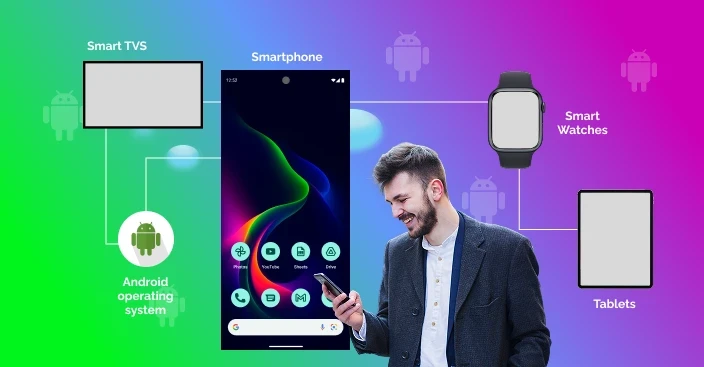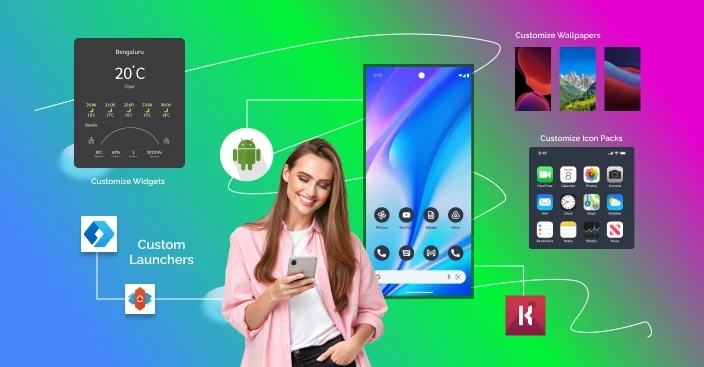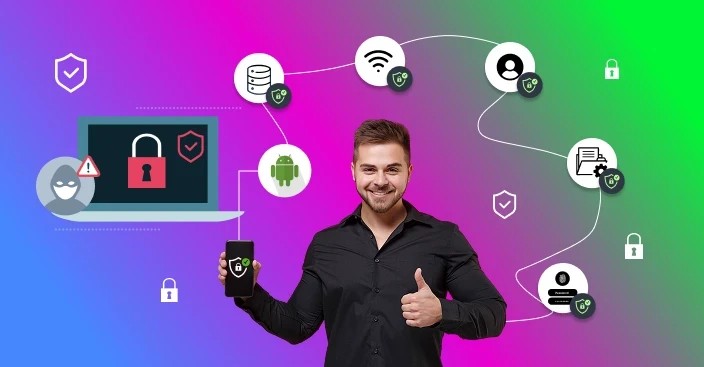Is Android the Best Operating System?

Table of Contents
There are many debates about which operating system is best for your phone. The leading contenders, Android and iOS, both have staunch supporters. Which group is correct? That’s a truly interesting question.
If you look purely at stats, as of 2025, Android continues to dominate the mobile OS landscape with a global market share of over 70%, according to StatCounter. It’s certainly one of the most popular options for smartphone manufacturers.
“In 2024 alone, Android powered over 3.6 billion devices worldwide, making it the world’s most widely used operating system across phones, tablets, and even IoT devices. It also has the largest number of apps. So if this were purely a popularity contest, Android would win hands down.
But is it the best option for you? In this post, we’ll take a look at the advantages and disadvantages of this operating system. We will examine these from the perspectives of both the app developer and the phone user. That way, we’ve got all bases covered.
Are you ready to discover the exciting world of Android? Let’s go.
A Brief History of Android
Contrary to what most people think, Google did not develop the Android system. The company that developed the software was acquired by Google two years after it began working on it. That’s only the beginning, though.
What is clear, though, is that the operating system has won over a strong fan base. Why is this? Let’s start answering that question by looking at the pros and cons for phone users and why they might choose Android over its competitors.
Why People Choose Android for Their Smartphones
If you were to go out into the world and poll smartphone owners about the ideal phone operating system, you’d find that they mostly fall into two distinct camps – iOS and Android. The only thing that these two disparate groups can agree on is that they are not interested in using Microsoft’s OS.
We’re not going to get into the iOS versus Android debate here – that could provide the basis for a whole book on its own. Instead, we’re going to focus on the Android side of the debate.
You Can Do More with Android
A significant complaint among some users regarding Apple is that the company dictates which apps can be used on their phones and which ones cannot. With an iPhone, you are only allowed to download apps from Apple’s App Store. If an app is not available there, that’s it.
The reasoning behind Apple’s decision is sound. It has implemented this restriction because third-party providers don’t always put the same care into developing apps as Apple does.
Considering that many apps on third-party sites contain malware, we can understand Apple’s reluctance here. The problem is that Apple takes its veto power a little too far and may use this excuse to narrow the field of competition.
Apple’s past app restrictions, similar to those with early versions of Google Voice, highlight its tight control over competition, a characteristic that Android avoids.
With Android, on the other hand, you decide which apps you can download, and you can do so from third-party sites. Android now leads in AI integration and voice assistant customization.
With Google Gemini AI embedded across many Android devices, users can personalize voice commands, predictive text, and contextual suggestions — a feature that Apple’s Siri is still catching up with.

Better Customization is Possible
Another bugbear with Apple is that you cannot make adjustments to the basic operating system to tweak your phone. Now, if you’re not all that clued up when it comes to computers, this is not such a big deal – you’ll want to use your phone out of the box as it is.
If you prefer a more customized approach, however, this could drive you nuts. With some tweaking, you can change the input methods that you use, customize the screen, and a whole lot more with Android.
With an iPhone, the changes that you are allowed to make are a lot more limited. Again, the reason Apple cites for doing this is security. It’s concerned that if users are allowed to make too many tweaks, they might inadvertently make devices more susceptible to cybercriminals.
Android-Based Phones Come in Many Different Shapes and Sizes
With Apple, you can choose an iPhone or a tablet. There are different models for each and a range of different choices that you can make but, at the end of the day, you’re looking at many of the same features.
It’s also no secret that an iPhone is a high-ticket item that not everyone can afford. That could well be the primary reason that Android-based devices are crushing it. You can find an entry-level smartphone at a reasonable rate or opt for a higher-ticket phone if you have the budget.
Now, not all phones will match the features that the iPhone has, but they’ll still give you an insight into the world of smartphones at any price level.
The Google Play Store is Less Strict when Accepting Apps
There are certainly some apps out there that have less than desirable content or controversial content. If Apple determines that an app is out of bounds in terms of politically incorrect, it’s likely to ban it. If you had bought the app that was subsequently banned, you would lose access to it.
Apple has a good point here – it doesn’t want to promote apps that could have a seriously negative impact. We can understand why it wouldn’t want to promulgate hate speech or something similar, but we still find this behavior to be somewhat dictatorial.
It’s easier to get an app approved for the Google Play Store as Google doesn’t take the same hard line that Apple does. Besides which, if the app is not available in the app store, you could still buy it directly from the developer.
The issue that we really have with Apple, in this case, is that we should be able to decide what content we want to consume.Some users value the freedom to access unconventional or controversial content, a freedom Android’s openness enables
You Can Install Customized ROMs
This is only going to be interesting to those who have some IT knowledge. If you wanted to, you could jailbreak an iPhone. That means that you can alter the operating software so that you can make the desired adjustments.
It’s not all that difficult, but it could land you in trouble with the law. Jailbreaking an iPhone is against the law. Apple has made it harder to do as well by ensuring that updates to the software will be able to undo these customizations.
If you’re interested in installing custom ROMs, then, Android is a better option. In fact, some phone manufacturers make it simpler for you by allowing you to tinker with the system.
More Apps to Choose From
Since you can download apps from the Store or directly from developers, you have a wider range of options to choose from. By 2025, Google Play Store houses over 3.5 million apps, compared to Apple’s 2.2 million. Android’s more relaxed submission policies continue to attract a larger developer base.
Disadvantages of Android
Now, like with everything in life, Like any technology, Android offers both advantages and trade-offs.. Let’s examine some of the drawbacks associated with Android.
Security is a Concern
We might view Apple as a stern dictator, but there’s no question that its stricter criteria help make devices more secure. After all, if you can’t mess with the basic operating system’s settings, you can’t accidentally make errors that might increase your phone’s vulnerability to attack.
The fact that Android allows you to download apps from unknown sources can also be problematic from a security perspective, especially when you consider that while Android’s openness allows flexibility, it also demands more vigilance.

A 2023 McAfee report noted that malware-infected apps made up around 3.3% of third-party Android downloads, largely due to sideloading from unverified sources. Google’s Play Protect now scans over 125 billion apps daily to catch threats before they can harm users.
So even though Android allows you freedom with where to source apps, it’s a freedom that you need to exercise intelligently. In other words, you have to be extra careful vetting any site or app that you’re considering to download.
Updating is Not Automatic
Another issue with Android is that updates are not usually run automatically. Apple is good at getting new updates out and informing you to install them. With Android-based devices, however, it’s not usually automatic.
As a result, there is only a small percentage of phones running the latest version of Android. This is problematic because updates include security patches and improvements that make the device more secure.
You cannot take advantage of that additional security without installing the update, though. As a result, phones running the older versions may be easier to hack.
Let’s move on now to the developer side of things and see why many developers choose Android over iOS.
Why Developers Might Prefer Android?
Start-Up Costs are Lower
From the outset, the costs are lower. Android provides a development kit free of charge. This means that even if you’re running on a shoestring budget, you’ll be able to get started with developing your app.
You can continue using the software without having to worry about paying annual licensing fees. This is a big plus, especially when you’re not 100% sure that the app you are developing is going to pan out.
The Software is Open Source
The software itself is open source. Why’s this important? Because not only can you use the software for free, but you can also make changes to it if you like. This has led to a strong community of developers who are all able to draw on the experience of others.
If you’re having a problem developing your app, there are a lot of helpful community members that may be able to help you out.
You’ll also get to learn and benefit from some of the changes that other developers have implemented. Think of it this way – if you set a problem to two different classes of students, who will come up with the right answer faster?
The chances are that it will be the class with more people in it. Why? Because everyone has their own unique way of looking at a particular problem. The more people there are working on finding a solution, the faster the solution is bound to be found.
It’s Easy to Integrate
Perhaps you have an app that you developed a while ago and would like to update. That’s no problem. The platform will allow you to tweak the old app to get better performance or add features. You can quite easily integrate any new features that you want to add with the existing app’s software.
You Have Options When it Comes to Sales
If you want to use the iOS system to build your app on, you have only one marketplace that it can be sold on – the Apple iStore. That’s all good and well, but what if you want to distribute your app directly to the end-consumer? With Android, you can do that.
It’s Easier to Get an App Listed in the Google Play Store
As a developer, there’s not much point in creating the perfect app if you can’t sell it. Apple is extremely strict when it comes to what apps it will accept. Google is not quite as strict.
Now obviously, both stores are going to take measures to keep malicious apps off their sites. Apple, however, is more likely to decline an app that appears to be dodgy.
Android is Easier to Use
Creating an app for iOS requires a firm understanding of programming languages. With Android, all you need is an understanding of how Java works.
Modern Android development relies on languages like Kotlin and tools like Android Studio or Flutter, which streamline cross-platform app creation.
Why Developers Might Have Issues with the Android OS
If everything is so rosy for Android-based apps, then why some developers use iOS instead? In this section, we’ll look into the potential issues that developers might have when creating an Android-based app.
Android Users Don’t Spend as Much
If you take a look at the actual amount that users are willing to spend in the Apple Store versus the Google Play store, you’ll notice that Apple users tend to spend more on their apps. See for yourself in the chart from Statista below.
Does that mean that Apple clients are more willing to spend the money or that they have more money to spend? If you think about it, considering that iPhones are a higher ticket item, it makes sense that their users might have more money.
But the real reason for the difference in spending might be more prosaic in nature .Due to ongoing restrictions, the Google Play Store remains unavailable in mainland China, which limits access to one of the largest app markets.
While the Chinese market remains a significant driver of mobile app growth, Google Play is still banned in mainland China.
However, alternative app ecosystems like Huawei’s AppGallery and Xiaomi’s Mi Store are helping bridge that gap for Android developers.
That’s a huge source of potential revenue discarded in one fell swoop. And indications are that it’s not likely to change anytime soon.
That’s something to consider as a developer. Getting a share of 30% of the app downloads is still pretty good, but it’s nothing compared to what you might be missing out on.
That’s a vast market that might be left untapped at that stage. It’s also worth noting that you’re not only missing out on potential app sales, but also the profits from any in-app purchases that you might choose to add.
Security Problems
Because the software is open source, it is simple enough to start out. The problem is that if Google releases an update, you need to incorporate that update as well. It’s not a huge issue, but it can be problematic after the app has been developed and released.
If users aren’t rapid to update their systems, their phones might be more vulnerable to being hacked. This means that developers need to take more steps to ensure that their apps are secure.
This adds to the cost of developing the app, and also the complexity of doing so.
There are Many Different Devices to Choose From
When it comes to selling your app, the more devices that it can be used on, the better it is for you. There’s a downside to this much wider range of devices, though. You’ll need to make sure that your app works across a range of different devices and screen sizes.
This could prove harder than it might seem initially. It’s difficult to create an app that will look good no matter what screen, type of device or even manufacturer it is being viewed and used on.
Testing Can be Problematic
There are numerous ways to test an app. With Android users running older versions of the operating software, it becomes harder to do, though. You’ll have to test how well the app runs on all versions of the OS.
Google’s More Lenient Acceptance Policy Could Bite You in the Butt
As we have already indicated, Google is more lenient about the apps it accepts. That defines both the good and the bad things. It’s good if you want to get your app on the market as quickly and easily as possible. How can this bite you in the butt?
Google doesn’t run copyright checks before accepting an app. This means that you could actually duplicate an existing app, knowingly or unknowingly.
Whether this was a genuine error or a calculated move, you can run afoul of copyright laws. You could also find yourself being the one whose app is copied.
Final Notes
At the end of the day, in 2025, Android remains the go-to operating system for users seeking versatility, personalization, and global device compatibility. While iOS edges out in terms of uniform security and user spend, Android wins on openness, diversity, and innovation.
The better OS? It depends on whether you prioritize freedom or control, customization or uniformity. In the ever-evolving mobile ecosystem, Android’s flexibility continues to make it a future-forward choice.
Author bio:
Nick Galov, Hosting Expert and Content Manager at Techjury.net. Nick is on a mission to improve the world of web hosting for some time now. When he got the chance to contribute to the betterment of all kinds of software, he simply couldn’t say no. When not geeking it out, he enjoys lager and football.
FAQs
 What is Android?
What is Android?
Android is a mobile operating system developed by Google. It powers smartphones, tablets, smart TVs, and even some IoT devices. It’s known for being flexible and customizable compared to other operating systems like iOS.
 Is Android better than iOS?
Is Android better than iOS?
It depends on what you want. Android offers more freedom, customization, and device variety, while iOS is known for security, smooth updates, and a consistent experience. If you like flexibility, Android might suit you better.
 Is Android safe to use?
Is Android safe to use?
Yes, Android is safe to use, but you need to be careful. Because it allows apps from outside the Google Play Store, there’s a higher risk of malware. Using trusted sources and enabling Google Play Protect can help keep your device secure.
 Why do developers like Android?
Why do developers like Android?
Developers prefer Android because it’s open-source, free to use, and easier to publish apps. It also has a bigger global user base, which means more potential downloads.



